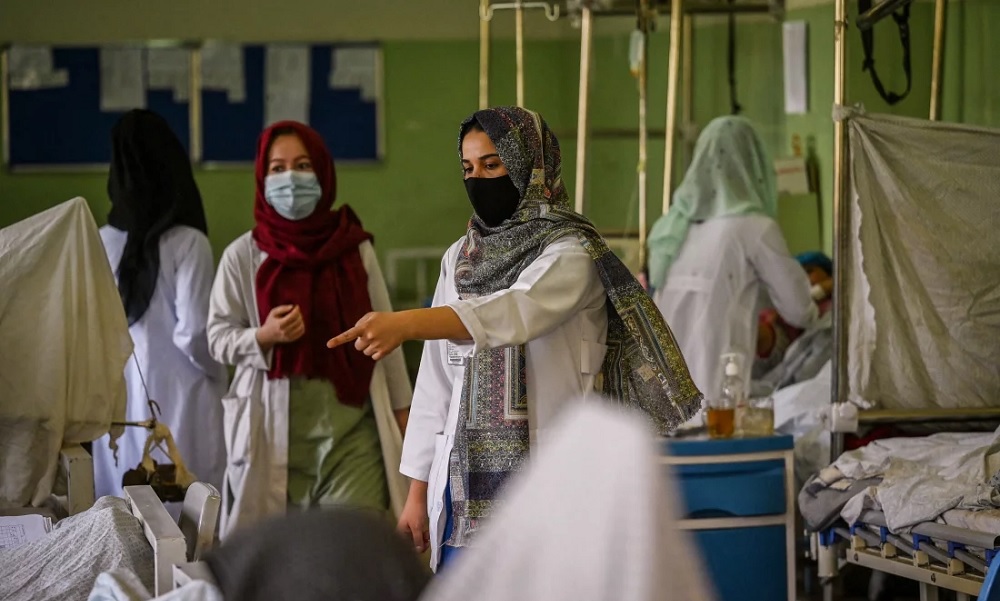Health
Massachusetts identifies first 2022 U.S. case of monkeypox infection

The Massachusetts Department of Public Health on Wednesday said it had confirmed a single case of monkeypox virus infection in a man who had recently traveled to Canada.
The U.S. Centers for Disease Control and Prevention (CDC)said its labs confirmed the infection to be monkeypox on Wednesday afternoon.
The state agency said it was working with CDC and relevant local boards of health to carry out contact tracing, adding that "the case poses no risk to the public, and the individual is hospitalized and in good condition."
The Public Health Agency of Canada late on Wednesday issued a statement saying it is aware of the monkeypox cases in Europe and is closely monitoring the current situation, adding no cases have been reported at this time.
Monkeypox, which mostly occurs in west and central Africa, is a rare viral infection similar to human smallpox, though milder. It was first recorded in the Democratic Republic of Congo in the 1970s. The number of cases in West Africa has increased in the last decade.
Symptoms include fever, headaches and skin rashes starting on the face and spreading to the rest of the body.
The Massachusetts agency said the virus does not spread easily between people, but transmission can occur through contact with body fluids, monkeypox sores, items such as bedding or clothing that have been contaminated with fluids or sores, or through respiratory droplets following prolonged face-to-face contact.
It said no monkeypox cases had previously been identified in the United States this year. Texas and Maryland each reported a case in 2021 in people with recent travel to Nigeria.
The CDC also said it is tracking multiple clusters of monkeypox reported in several countries including Portugal, Spain, and the United Kingdom, within the past two weeks.
A handful of cases of monkeypox have recently been reported or are suspected in the United Kingdom, Portugal and Spain.
Earlier on Wednesday, Portuguese authorities said they had identified five cases of the infection and Spain's health services said they were testing 23 potential cases after Britain put Europe on alert for the virus.
European health authorities are monitoring any outbreak of the disease since Britain reported its first case on May 7 and has found six more in the country since then.
Health
Herat Regional Hospital struggling to deal with heavy patient load

Herat Regional Hospital has a capacity to treat about 1,000 patients a day, 650 as in-patients. However, the hospital is being stretched to its limits and is treating more than double this number of people every day, hospital officials say.
Officials say that in most wards, there are two patients per bed. They say the hospital needs to expand - that they urgently need more space and more equipment.
According to doctors, the High Care Unit has only 10 beds, when it actually needs at least 65. In addition, they say the dialysis department is only running at half-mast. It has 17 dialysis machines, but only eight are in working order.
Herat residents have also raised concern over the state of the hospital and said some departments, especially the dialysis unit and pediatrics urgently need equipment and additional space.
Afghanistan is grappling with significant health challenges marked by a fragile healthcare system and unequal access to services, particularly in rural areas.
This is due to a number of issues such as transportation difficulties, shortage of healthcare professionals, and limited access to quality healthcare services.
Despite efforts to improve the country’s healthcare infrastructure, Afghanistan continues to grapple with systemic issues that hinder effective healthcare delivery. Analysis by UN agencies of under-served areas shows that 13.2 million people in 34 provinces reside in areas where primary healthcare services are not accessible within a one-hour walking distance.
Health
Excluding Afghan women from medical institutes threatens the future of health care in the country: MSF

The Islamic Emirate of Afghanistan’s (IEA) decision to bar women from studying in medical institutes will have far-reaching consequences for women’s health in the country, Médecins Sans Frontières (Doctors Without Borders) said on Friday.
This is another stage in the removal of women from public and professional life in Afghanistan. Already, there is an insufficient number of female health care workers in the country, impacting the availability of health care, especially given the separation of hospital wards by gender. New constraints will further restrict access to quality health care and pose serious dangers to its availability in the future, MSF said in a statement.
“There is no health care system without educated female health practitioners,” said Mickael Le Paih, MSF’s country representative in Afghanistan. “At MSF, more than 50 percent of our medical staff are women. The decision to bar women from studying at medical institutes will further exclude them from both education and the impartial provision of health care.”
The medical needs in Afghanistan are huge, and more female Afghan medical staff need to be trained to address them. For this to happen, women need to have access to education. Education restrictions for women and girls put in place in 2024, 2022, and 2021 considerably reduce the number of female medical staff in the future, MSF said.
“If no girls can attend secondary school, and no women can attend university or medical institutes, where will the female health professionals of the future come from and who will attend to Afghan women when they are at their most vulnerable?” said Le Paih. “For essential services to be available to all genders, they must be delivered by all genders.”
Recently, there have been reports that the leader of the Islamic Emirate has ordered the closure of medical institutes to women. The Islamic Emirate has not yet officially commented on this matter.
Health
Afghanistan’s health minister visits disease control center during China visit
Jalali, in China for the World Conference on Traditional Medicine 2024, said that traditional medicine in Afghanistan needs to be regulated and integrated into modern healthcare practices

Afghanistan’s Acting Minister of Public Health has held in depth discussions on managing diseases such as malaria, tuberculosis, and polio with China’s Deputy Director for Disease Control and Prevention, Shen Hongbing.
On an official visit to China, Mawlawi Noor Jalal Jalali also discussed other issues, with Shen and other officials, such as monitoring of diseases, disaster management processes and capacity building for Afghan healthcare workers.
Jalali, who was in China for the World Conference on Traditional Medicine 2024, also toured China’s Disease Control and Prevention Center (CDC) and its National Influenza Center.
The conference, which was held on Tuesday and Wednesday in Beijing, was jointly held by the World Health Organization (WHO) and Chinese sponsors, including China’s National Health Commission.
The opening ceremony of the two-day event was attended by health officials of governments and international organizations, experts and scholars, and deputies from medical institutions.
WHO Director-General Tedros Adhanom Ghebreyesus gave a speech via video.
Addressing delegates at the conference, the ministry cited Jalali as having said that traditional medicine in Afghanistan needs to be regulated and integrated into modern healthcare practices.
He also advocated for strengthened bilateral cooperation between China and Afghanistan to enhance capacity building, experience sharing, and joint research in the sector.
Afghanistan’s health ministry has meanwhile established a Traditional Medicine Department which is currently tasked with formulating policies and guidelines to regulate and improve this sector.
-

 Sport5 days ago
Sport5 days agoZimbabwe’s opening ODI against Afghanistan abandoned
-

 World4 days ago
World4 days agoNorth Korean troops suffer 100 deaths, struggling in drone warfare, South Korea says
-

 Latest News2 days ago
Latest News2 days agoAfghan men must stand with women to support viable future of country: US envoy
-

 Latest News4 days ago
Latest News4 days agoTwo horror accidents on Kabul-Kandahar highway leave 52 dead
-

 Sport3 days ago
Sport3 days agoAfghanistan crush Zimbabwe by 232 runs in second ODI
-

 Regional5 days ago
Regional5 days agoIran’s president to make rare visit to Egypt for D-8 summit
-

 International Sports4 days ago
International Sports4 days agoLanka T10: Kandy Bolts in at 4th spot in playoffs after thrilling day
-

 World5 days ago
World5 days agoNATO takes over coordination of military aid to Kyiv from US, source says
























